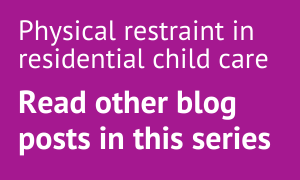Professional training is essential to provide the best support for our young people
Joe Gibb is a Service Manager with Compass Child and Family Services.

We know there are many things that need to change in residential child care in Scotland, and as a service manager, our team has been looking closely at our practice, the environment we work in and staff training to see what we can improve on to make the lives of the young people we serve better.
We want our home to be just that, a home where young people, who for whatever reason, cannot remain with their family, can feel safe and secure. It’s imperative that our young people feel valued and to do that the physical environment needs to be right. If the environment looks institutional and is formed through policies and procedures, it can be toxic. Children don’t need the health and safety notice front and centre in a living space. The look and feel of the space matters: we can be like family to the young people in our care, if that’s what young people want, and as such want to create an environment as close to a family home as we can.
It's not a last resort
But, there’s so much more we need to do at a local authority, national and political level. I regularly see young people placed in my care who have been through several failed placements, and residential child care is seen as the ‘last resort’, and that is just not good enough.
It is time to change the way we think about residential care - for some young people who are unable to live with their birth families, I believe that this is the right and best place for them to live, and should be seen as a viable choice. How children transition in, or out of residential care can be detrimental to their mental wellbeing. Provided proper assessment is carried out it’s important residential care is used proactively as the first and right choice for some young people. Otherwise we have unsettled, distressed children who have a view that they are useless and have no self-worth, thinking they have been placed at the bottom of the heap. This leads to anger, resentment and ultimately harmful behaviour. If young people feel safe and respected, then there’s a drop in harmful behaviours that would require physical intervention, to keep the young person, and/or others safe from harm.
Staff need trained to degree level
It’s time for residential childcare workers to be recognised for the complex and difficult job they do, and it’s also time to give them the tools they need to care for young people in the best possible way. This is a two pronged approach, a mixture of on-the-job training and educational qualifications. It’s time to dust off the proposal to train all staff to degree level and give them the skill set and status they deserve. It’s a complicated process for carers to reach this level, I’m not denying that, but it is required – it should start with an engagement process soon, to ensure everyone’s voice is heard. How it could be implemented; how experience and other qualifications fit into the mix; and what demands we would put on long-serving experienced carers without causing undue stress, all need to considered and discussed.
If carers want top embark on a traditional University degree programme, I think it’s important that they get the opportunity to do so, conversely I also think it’s important that those who would prefer to embark on other modes of learning then it’s important that option is there too. What’s really crucial is that the content of the qualifying award is correct!
An approach steeped in social pedagogy
I have recently moved to a new post with a children’s charity. In our home we are training in relational practice, we’re attachment based and try where possible to replicate a family environment. If we use an approach steeped in social pedagogy then I believe the outcomes will be far better. We can drastically reduce the need to use physical restraint by employing other approaches, because we know what works for each individual young person when they become distressed and don’t know how to control or manage their emotions, and we know how to do this through building relationships and trust.
In residential child care we know from research what works, so why has it not already been put into practice? We also need to dispel the myth that we’ve let a young person down if a physical intervention occurs. It’s all about the needs of the children and young people and it’s essential we keep them safe and teach them other coping mechanisms.
There needs to be a sensible approach to what’s best for the young people in our care and these discussions can only lead to an improvement in the care we provide.
Update | September 2021
Joe Gibb is now a House Manager with Renfrewshire Council. Here he reflects two years on from the original blog post.
The following video was recorded as part of SIRCC 2021 Online.
The views expressed in this blog post are those of the author/s and may not represent the views or opinions of CELCIS or our funders.
Commenting on the blog posts
Sharing comments and perspectives prompted by the posts on this blog are welcome. CELCIS operates a moderation process so your comment will not go live straight away.



